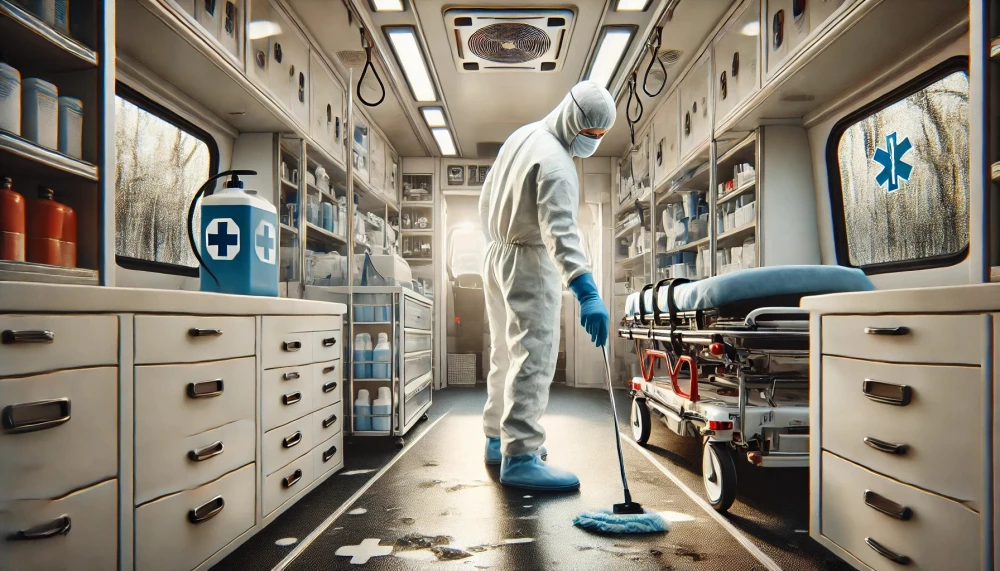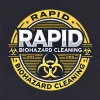Biohazards - What Should You Do When You Have One?

Ambulance Cleaning
Get in touchIn the fast-paced, high-stakes environment of emergency medical services, maintaining a clean and safe ambulance is not just a matter of compliance; it is a crucial factor in ensuring the well-being of patients and staff.
Ambulance cleaning is a specialised service that requires expert knowledge, meticulous attention to detail, and adherence to strict protocols.
This is where Rapid Biohazard Cleaning excels. We offer top-tier cleaning services that prioritise safety, hygiene, and peace of mind.
What is Ambulance Cleaning?
Ambulance cleaning involves thoroughly cleaning, disinfecting, and sanitising the interior of ambulances to eliminate harmful pathogens, biohazards, and contaminants.
Ambulances are particularly susceptible to contamination due to the nature of their work, which involves transporting patients with infectious diseases and responding to medical emergencies.
Regular and thorough cleaning is essential to prevent the spread of infections, protect patients and staff, and ensure the ambulance is always ready for its next mission.
What Does Ambulance Cleaning Entail?
Ambulance cleaning involves several critical steps:
Pre-Cleaning Assessment: This initial stage involves a thorough inspection of the ambulance to identify areas that require special attention, such as blood spills, bodily fluids, or contaminated medical equipment.
Surface Cleaning and Disinfection: All surfaces within the ambulance, including stretchers, seats, floors, and walls, are cleaned and disinfected using industry-approved products. This process removes visible dirt and kills any pathogens that may be present.
Deep Cleaning: High-touch areas, such as door handles, light switches, and medical equipment, receive special attention. Deep cleaning involves using specialised tools and techniques to reach every nook and cranny, ensuring no part of the ambulance is overlooked.
Air Purification: Airborne pathogens can pose a significant risk in enclosed spaces, such as ambulances. Air purification systems and techniques are employed to remove any lingering contaminants from the air.
Final Inspection: After cleaning, a comprehensive inspection is conducted to ensure all areas meet the required standards. This step is crucial to guarantee that the ambulance is safe and ready for use.
Documentation: Proper documentation is provided, detailing the cleaning processes undertaken and any observations made. This is essential for compliance and quality assurance.
Why Choose Rapid Biohazard Cleaning for Ambulance Cleaning?
When it comes to ambulance cleaning in , Rapid Biohazard Cleaning stands out as the preferred choice for several compelling reasons:
Expertise in Biohazard Management: With extensive experience in handling biohazard situations, Rapid Biohazard Cleaning is well-equipped to manage the unique challenges of ambulance cleaning. Our team is trained to handle hazardous materials safely and effectively, ensuring the highest standards of hygiene.
Use of Advanced Cleaning Techniques: We employ the latest cleaning technologies and methods to ensure a thorough and efficient cleaning process. Our commitment to staying up-to-date with industry advancements ensures that we deliver services that are both effective and compliant with the latest health and safety regulations.
Tailored Services: We understand that every ambulance and situation is unique. Our services are tailored to meet the specific needs of each client, whether it’s a routine clean or a deep clean after a biohazard incident.
Reliability and Professionalism: At Rapid Biohazard Cleaning, we take pride in our professionalism and reliability. We work around your schedule to minimise downtime, ensuring that your ambulances are back in service as quickly as possible.
Commitment to Safety: Safety is at the core of everything we do. Our team is fully trained and certified in biohazard cleaning, and we adhere to the highest standards to protect both our staff and your medical personnel.
Frequently Asked Questions (FAQs)
1. How often should ambulances be cleaned?
Ambulances should be thoroughly cleaned after every use, especially after transporting patients with infectious diseases or those who have been exposed to bodily fluids. Regular deep cleaning should also be scheduled to maintain hygiene and safety standards.
2. What disinfectants are used in ambulance cleaning?
We use hospital-grade disinfectants that are effective against a wide range of pathogens, including bacteria, viruses, and fungi. These disinfectants are selected for their efficacy and safety.
3. Can Rapid Biohazard Cleaning provide emergency cleaning services?
Yes, Rapid Biohazard Cleaning offers emergency cleaning services to address urgent situations, ensuring that your ambulance is safe and ready for immediate use.
4. How do you ensure compliance with health regulations?
We adhere to strict protocols and guidelines established by health authorities to ensure full compliance with all relevant regulations. Our team is continuously trained to stay updated with the latest standards.
Conclusion of Ambulance Cleaning
Ambulance cleaning is a vital service that ensures the safety and well-being of patients and healthcare providers.
Rapid Biohazard Cleaning provides a comprehensive, reliable, and expert cleaning service that consistently exceeds the highest standards. By choosing us, you’re not just opting for cleanliness; you’re choosing a partner dedicated to safety, efficiency, and professionalism.
Keep your ambulances ready for action with Rapid Biohazard Cleaning—a trusted name in biohazard management and hygiene services.
